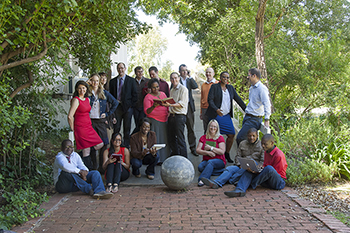Latest News Archive
Please select Category, Year, and then Month to display items
08 April 2021
|
Story Thabo Kessah
|
Photo UFS Photo Archive
 Dr KPD Maphalla with former UFS Chancellor, Dr Franklin Sonn, during the graduations in April 2007.
Dr KPD Maphalla with former UFS Chancellor, Dr Franklin Sonn, during the graduations in April 2007.
The University of the Free State is sad to learn of the passing of alumnus and award-winning Sesotho literary giant, Dr KPD Maphalla.
The literary works of Dr Khotso Pieter David Maphalla, like many other African writers and artists, were influenced and characterised by his own era of powerful forms of oppression and exclusion from dominant literary discourses. In his own right and through his writings of poetry, novels, short stories, and kodiamalla (dirge), he articulated a deliberate political and social protest and pushed for a place for African languages in literature at the height of apartheid.
“He entered the professional scene with his ground-breaking novel, Kabelwamanong, in 1982 at the age of 27. His career actually started in 1971 while he was still at school. Since his first novel, he has produced at least two books annually, covering the genres of poetry, novels, dramas, and short stories. As a dramatist, Dr Maphalla has written a number of excellent and educative radio dramas for the then Radio Sesotho (now Lesedi FM),” said his long-time friend and Head: African Languages at the University of the Free State, Dr Nyefolo Malete.
“It was for this writing prowess that he received recognition from the UFS when he was awarded an Honorary Doctorate in Literature by the Department of African Languages during a momentous ceremony on the Qwaqwa Campus in 2007,” added Dr Malete.
Dr Malete also revealed that, despite losing the use of his right hand after suffering a stroke following a car accident in the late 1990s, Dr Maphalla continued writing using his left hand. “He was adamant that, what he referred to as his ‘supposed disability’, would not deter his passion for writing.”
Dr Maphalla’s work has also produced numerous scholarly studies by the likes of Profs Moleleki Moleleki (protest poetry), Thapelo Selepe (lament and protest poetry), and Dr Seema Seema (process of cross-cultural communication). He was a committed Qwaqwa community member, who was also instrumental in the founding of Qwaqwa Community Radio (2000) and Metjodi Writers (2006), among others. He has written more than 70 books, many of which have been prescribed texts in schools.
Some of the awards he has won include:
South African Centre for Digital Language Resource (SADiLar) Sesotho Lexicographic Unit (Sesiu sa Sesotho) Lifetime Award for outstanding literary works and for promoting Sesotho literature (2019).
The Literature Festival and the University of the Free State Award for enormous contribution to Sesotho literature by a South African writer (2019).
Lifetime Achiever Award in Literature awarded by the Department of Arts and Culture (2005).
M-Net Book Prize for Sesotho poetry (2005). The first and thus far the only Sesotho author to have received this honour.
M-Net Book Prize for best novel (1996).
De Jager-HAUM Literary Award for his volume of short stories, Mohlomong Hosane (1993).
Thomas Mofolo Trophy for Best Novel, Best Poetry, and the Overall Award (1992).
Thomas Mofolo Trophy for Best Poetry (1991).
Dr JJ Moiloa Floating Trophy for Best Sesotho Poetry Book of the Year, Kgapa tsa ka (1985).
Prestige Scholars Programme invests in promising academics
2015-06-24

Photo: Sonia Small |
Whilst many academics find it challenging to have sustainable funding for specific projects, it is often just as challenging to find relevant exposure and good mentorship programmes to fully prepare academics toward becoming full professors.
Prof Jonathan Jansen, Vice-Chancellor and Rector of the UFS, designed the Vice-Chancellor’s Prestige Scholars Programme (PSP) specifically targeting newly-completed post-doctoral students who are already members of the academic staff.
The goal is to select the most promising young scholars and to make substantial institutional investment in their development.
To date, the PSP has produced 2 Fulbright scholars; 10 National Research Foundation (NRF) rated scholars; 1 NRF Blue Skies research project and 14 NRF Thuthuka-funded projects. These scholars work with the best academics at leading universities on three continents.
Prof Jackie du Toit, co-director of the programme, explains that while the PSP does not provide funding, it is a great programme to empower scholars by means of assistance towards generating funding from outside sources.
Prof Du Toit co-directs this programme with Proff Corli Witthuhn, Vice-Rector: Research and Niel Roos from the Department of Africa Studies.
“The PSP bases its approach to funding on the philosophy that young scholars are to be encouraged towards financial independence, based on a viable postdoctoral project that would sustain their scholarship for five to eight years post PhD. We believe that the cachet and long-term sustainability of existing funding programmes such as Fulbright outweighs the short-term benefits of automatic funding from the PSP. We also endeavour to teach young scholars to work cleverly within institutional parameters, rather than leave them floundering once they step off the active PSP.”